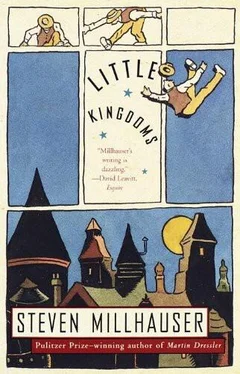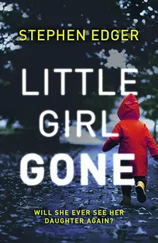A LACK OF SOMETHING. Although ours is a flourishing town — and we flourish, according to some, precisely to the extent that the inhabitants of the castle have declined in power and serve a largely symbolic or representative function — we nevertheless feel a lack of something. Our metal artisans are admired far and wide, our sturdy houses with their steep gables and oak window frames fill the eye with delight, beyond the walls our fields and vineyards overflow with ripeness. Our church steeples rise proudly into the sky, and toll out the hours on great bells cast by masters. In fact, it is not too much to say that our lives pass in a harmony and tranquility that are the envy and admiration of the region. Nor is ours a dull tranquility, stifling all that is joyful or dark; for not only are we engaged in vigorous lives, but we are human beings like all human beings, we know the joys and sorrows that come to human hearts. And yet it remains true that, now and then, we feel a lack of something. We do not know what it is, this thing that we lack. We know only that on certain summer afternoons, when the too-blue sky stretches on and on, or in warm twilights when the blackbird cries from the hill, a restlessness comes over us, an inner dissatisfaction. Like children we grow suddenly angry for no reason, we want something. Then we turn to the castle, high on the other shore, and all at once we feel a savage quickening. With a kind of violence our hearts exult. For across the sun-sparkling river, there on the far shore, we feel a heightened sense of things, and we dare for a moment to cry out our forbidden desire: for exaltation, for devastation, for revelation.
THE FOUR REASONS. Because of his high gifts in the realm of feeling, the dwarf understood something about the Prince that the Prince himself did not fully understand. The dwarf understood that the Prince, despite great wealth, a beautiful and virtuous wife, devoted friends, and a life that inspired the praise of all who knew him, bore within him a secret weakness: a desire for immense suffering. It was as if the experience of so much good fortune had created in the Prince a craving in the opposite direction. He had at last contrived to satisfy this desire by means of his wife, as though wishing to strike at the deepest source of his own happiness; and it was Scarbo’s role to confirm the Prince’s darkest suspicion and present him with the suffering he craved. The danger lay in the uncertainty of the Prince’s gratitude for such a service. Scarbo, radically set apart from the court and indeed from humankind by the accident of his diminutive stature, was a sharp observer of human nature; he understood that the Prince was furious at himself for being suspicious of his wife, and above all for inviting his dwarf to spy on her. The Princes sense that he had done something unclean might at any moment cause him to strike out violently at the instrument of his uncleanliness, namely, the dwarf. It was therefore essential that Scarbo not bear witness directly against the Princess, even though he crept nightly into the margrave’s chamber and listened through the closed bedcurtains in order to learn all he could about their lascivious trysts. To Scarbo’s surprise — to his bewilderment and anger — the margrave appeared to be innocent. This the dwarf attributed to a deep and still unfathomable design on the part of the margrave, whom he detested as the Prince’s former favorite. The Prince would surely have believed a report of lecherous foul play in the margrave’s tangled sheets, but Scarbo feared the force of the Princess’s denial, as well as the Prince’s rage at a witness of his wife’s degradation. There was also something else. Although the Prince desired to suffer, and although the means he had chosen was his wife’s infidelity, he also desired to be released from suffering, to return to the time of sunlight before the darkness of suspicion had entered his soul. The abandonment of this second desire, even though that abandonment alone could usher in the fulfillment of the first desire, was sure to be so painful that its agent would appear an enemy. The solution to all these problems and uncertainties had come to Scarbo one night after a week of relentless thought. It was brilliantly simple: the Princess herself must denounce the margrave. The Prince could then have the margrave tortured and killed in good conscience and enter into the life of suffering he craved, without having cause to turn against his dwarf. Now, Scarbo knew that the Princess was steadfast in virtue, and would die rather than yield her body to the margrave; his plan therefore was to persuade her to denounce the margrave untruthfully. For this he urged four reasons. The first was this, that such a denunciation would put an end to the torment of her nightly humiliation, which the Princess had confessed to the dwarf during the first of their bower meetings. The second was this, that the Prince longed for her to denounce the margrave, and that by so doing she would be satisfying the Prince’s wish. The third was this, that the margrave in fact desired the Princess, and refused to take advantage of her solely because he feared the Prince; the margrave was therefore a traitor, and deserved to be exposed. And the fourth was this, that to confess the margrave’s fall would be to reawaken the Prince’s desire for her, and put an end to her nightly banishment from his bed. The Princess had listened to the dwarf’s reasons in silence and had promised to give her answer in the bower. Her refusal, on that occasion, had been firm, but it could remain only as firm as her inner strength; and the dwarf knew that under the ravagement of her suffering, her inner strength was weakening.
OF STORY AND HISTORY. For the most part we can only imagine the lives of those who live in the castle, lives that may in certain respects depart sharply from the particular shapes we invent as we brood across the river on midsummer afternoons. And yet it has been argued that these imaginary lives are true expressions of the world of the castle, that they constitute not legend, but history. They do so, it is said, not simply because here and there an invented episode set in the dim past may accidentally imitate an actual event, on the far side of the river; nor because our stories, however remote from literal truth, are images of eternal truths that lie buried beneath the shifting and ephemeral forms of the visible. No, our argument has a different origin. The argument goes that our tales are not unknown among the inhabitants of the castle, and in fact circulate freely among the courtiers, who admire the simplicity of our art or take up our stories and weave them into more refined forms, which we ourselves may sometimes hear recited by traveling minstrels in the courtyards of inns or in our market squares. But if our tales are known among the inhabitants of the castle, may it not come about that they begin to imitate the gestures that give them such pleasure, so that their lives gradually come to resemble the legendary lives we have imagined? To the extent that this is so, our dreams may be said to be our history.
THE FACE IN THE POOL. Day after day the Princess suffered the Prince’s displeasure, night after night she lay stony cold beside the margrave; and in her sorrowing and distracted mind the voice of the dwarf grew louder, urging her to put an end to her unhappiness, and restore the pleasure of vanished days. One afternoon when the Princess was out walking in the park with two ladies-in-waiting, she came to a pool, shadowed by overhanging branches. Stooping over, she was startled to see, beneath the water, a wrinkled old woman who stared at her with grief-stricken eyes. Even as she drew in her breath sharply she knew that it was her own face, changed by sorrow. For a long time the Princess gazed at the face in the water before rising and returning to her chamber, where she dismissed her women and sat down at a table. There she took up her Venetian mirror, with its frame of carved ivory, and looked into eyes that seemed to be asking her a frightening question. After a time she reached for her jars of cosmetic powders and, mixing a small amount of saliva with several compounds, began to apply skin whiteners and rouge to her cheeks. Faster and faster she rubbed the unguents into her skin with her fingertips, before stopping abruptly to stare at her pink-and-white face. With a sudden motion she reached over to a small silver bell that sat on the table beside an openwork pomander containing a ball of musk, and shook it swiftly twice. A moment later Scarbo appeared, with a low bow. Holding up the mirror, the Princess gestured disdainfully toward her pink-and-white image in the glass. At once the dwarf stepped over, climbed onto a stool covered in green velvet, and picked up a cloth. With a headshake and a sigh of disapproval he began wiping the ointments from her face, while he held forth on the art of cosmetics. Had the Princess never been told that a base of white lead was to be avoided, since it was known to produce harmful effects on the skin? Surely she had seen the telltale red spots on the faces of women of the court — spots that had to be treated with ground black mustard or snake-root. In place of white lead, might he suggest a mixture of wheat flour, egg white, powdered cuttlefish bone, sheep fat, and camphor? When Scarbo had finished cleaning the Princess’s face, he carefully selected half a dozen jars of powder from the table, holding each one up and studying it with a frown. In a copper bowl he prepared a whitish paste. Then, still standing on his stool, he leaned forward and began to apply the paste skillfully to the Princess’s cheeks with his small, jeweled fingers.
Читать дальше












